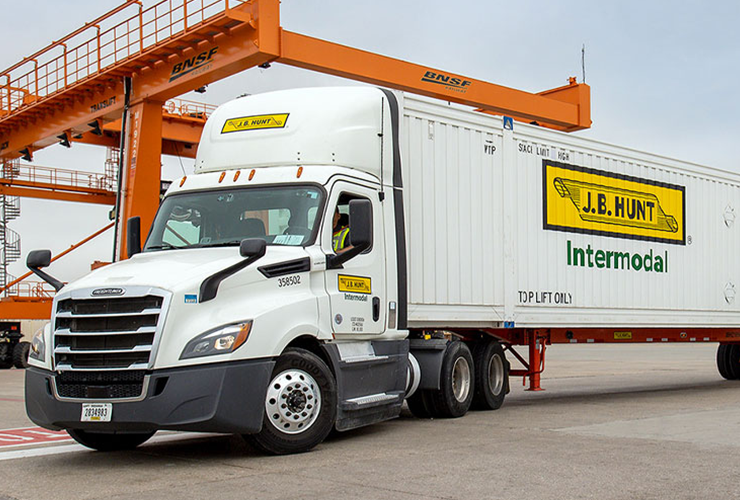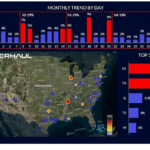J.B. Hunt Transport Services concluded the year slightly below its performance in the previous year’s fourth quarter as it focused on reinvesting and enhancing its operations, according to the company’s Jan. 16 report.
The carrier, headquartered in Lowell, Ark., reported a net income of $155.5 million, or $1.53 per diluted share, for the three months ending Dec. 31. This was an increase compared to the $153.5 million, or $1.47 per diluted share, reported during the same period a year earlier. However, total operating revenue fell by 5%, dropping to $3.15 billion from $3.3 billion.
“While 2024 was a continuation of the challenging freight environment, I am proud of the work of our team and how we position the company for our future,” J.B. Hunt CEO Shelley Simpson said during a call with investors. “We focus on providing excellent service to our customers, improving on our record-setting safety performance, and remaining cost discipline, all while leveraging our strategic investments in our people, technology and capacity.”
J.B. Hunt has been making significant reinvestments in the company to prepare for future growth. Simpson emphasized that these efforts aim to position the business for sustainable long-term expansion while delivering strong returns on capital and value to shareholders.
“The decisions we make to strategically hold onto our people and capacity through the freight recession and make some bold investments, like acquiring the intermodal assets from Walmart, were made through that lens and has only enhanced our future earnings potential,” Simpson noted. “That said, while our performance has held up relatively well in this difficult environment, we aren’t satisfied with the current results of our business.”
Simpson highlighted the need for improvements in margins and returns on capital, noting that company leadership is focused on steering the business toward repairing and enhancing its financial performance.
The revenue decline was mainly due to a slight drop in revenue per load in the intermodal and truckload segments, a 4% reduction in average trucks within Dedicated Contract Services (DCS), and a 22% decrease in load volume for Integrated Capacity Solutions (ICS). However, these challenges were partially offset by positive factors, including a 5% rise in intermodal volume, a 2% increase in productivity within DCS, and a 9% boost in gross revenue per load for ICS.
“JBHT barely missed our 4Q expectations, but 1Q guidance implies sequential earnings decline well below consensus,” TD Cowen analyst Jason Seidl wrote in a report. “Hunt is winning record volumes with strong service within [intermodal] though margins limit upside to growth as [over-the-road] market continues to weigh on pricing. Dedicated growth assumptions lowered in ’25 as churn and startup costs challenge the resilient segment.”
For the full year, J.B. Hunt reported a net income of $570.9 million, or $5.56 per diluted share, on total revenue of $12.1 billion. This was a decline from the prior year’s net income of $728.3 million, or $6.97 per diluted share, on revenue of $12.8 billion.
- Truckload Segment: Revenue fell 7% to $182 million from $195.4 million, primarily due to a 2% drop in revenue per load and flat load volume compared to the previous year. The total average effective trailer count declined by about 6%. Despite this, operating income improved significantly to $8.55 million from an operating loss of $39,000.
- Final Mile Services: Revenue decreased by 6%, dropping to $227.5 million from $243.2 million, driven by weaker demand across multiple end markets. However, improved revenue quality in underperforming accounts and new customer contracts partially offset the decline. Operating income rose 7% to $13.2 million from $12.3 million.
- Integrated Capacity Solutions (ICS): Revenue dropped 15% to $307.6 million from $363.7 million, as segment volumes fell 22% year-over-year. Despite this, revenue per load increased 9%, driven by higher contractual and transactional rates and changes in customer freight mix. Operating income improved from a loss of $24.9 million to a loss of $21.8 million.
- Dedicated Contract Services (DCS): Revenue declined 5% to $838.5 million from $883.9 million, due to reduced average truck counts and lower productivity. The customer retention rate stood at 90%, reflecting fleet downsizing and some account losses. Operating income increased by 5%, reaching $90.3 million from $86.1 million.
- Intermodal Segment: Revenue decreased 2% to $1.6 billion from $1.62 billion, largely due to a 6% drop in revenue per load stemming from shifts in freight mix, customer rates, and fuel surcharge revenue. A 5% rise in volume helped offset some of the decline. Operating income fell 10% to $117 million from $130 million.





